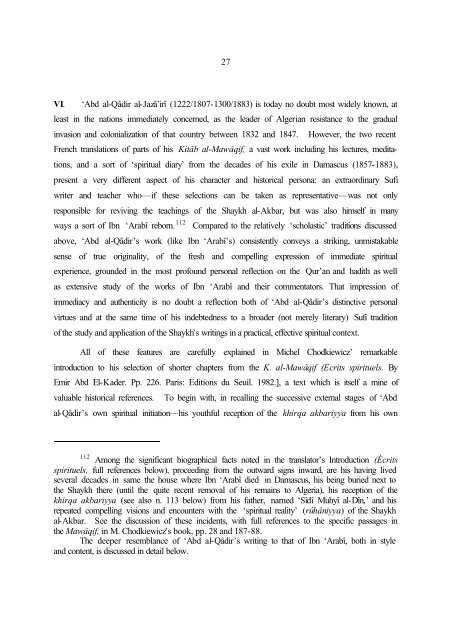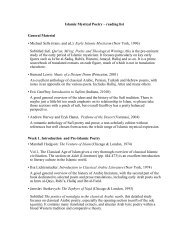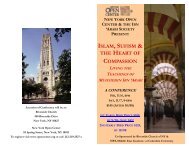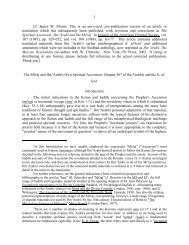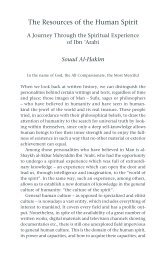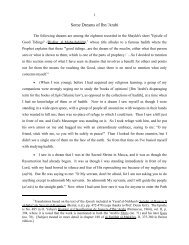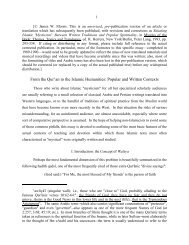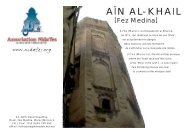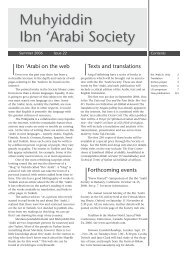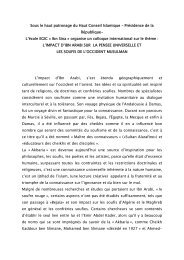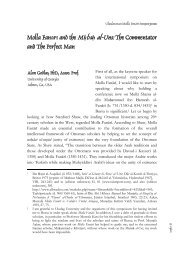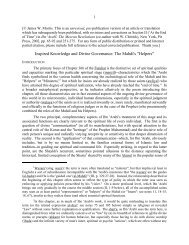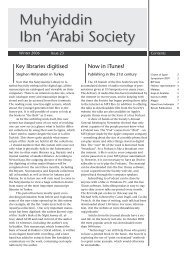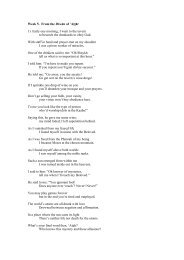Part III (pdf) - Muhyiddin Ibn Arabi Society
Part III (pdf) - Muhyiddin Ibn Arabi Society
Part III (pdf) - Muhyiddin Ibn Arabi Society
You also want an ePaper? Increase the reach of your titles
YUMPU automatically turns print PDFs into web optimized ePapers that Google loves.
27VI. ‘Abd al-Qâdir al-Jazâ’irî (1222/1807-1300/1883) is today no doubt most widely known, atleast in the nations immediately concerned, as the leader of Algerian resistance to the gradualinvasion and colonialization of that country between 1832 and 1847. However, the two recentFrench translations of parts of his Kitâb al-Mawâqif, a vast work including his lectures, meditations,and a sort of ‘spiritual diary’ from the decades of his exile in Damascus (1857-1883),present a very different aspect of his character and historical persona: an extraordinary Sufiwriter and teacher who—if these selections can be taken as representative—was not onlyresponsible for reviving the teachings of the Shaykh al-Akbar, but was also himself in manyways a sort of <strong>Ibn</strong> ‘Arabî reborn. 112 Compared to the relatively ‘scholastic’ traditions discussedabove, ‘Abd al-Qâdir’s work (like <strong>Ibn</strong> ‘Arabî’s) consistently conveys a striking, unmistakablesense of true originality, of the fresh and compelling expression of immediate spiritualexperience, grounded in the most profound personal reflection on the Qur’an and hadith as wellas extensive study of the works of <strong>Ibn</strong> ‘Arabî and their commentators. That impression ofimmediacy and authenticity is no doubt a reflection both of ‘Abd al-Qâdir’s distinctive personalvirtues and at the same time of his indebtedness to a broader (not merely literary) Sufi traditionof the study and application of the Shaykh’s writings in a practical, effective spiritual context.All of these features are carefully explained in Michel Chodkiewicz’ remarkableintroduction to his selection of shorter chapters from the K. al-Mawâqif (Ecrits spirituels. ByEmir Abd El-Kader. Pp. 226. Paris: Editions du Seuil. 1982.], a text which is itself a mine ofvaluable historical references. To begin with, in recalling the successive external stages of ‘Abdal-Qâdir’s own spiritual initiation—his youthful reception of the khirqa akbariyya from his own112 Among the significant biographical facts noted in the translator’s Introduction (Écritsspirituels, full references below), proceeding from the outward signs inward, are his having livedseveral decades in same the house where <strong>Ibn</strong> ‘Arabî died in Damascus, his being buried next tothe Shaykh there (until the quite recent removal of his remains to Algeria), his reception of thekhirqa akbariyya (see also n. 113 below) from his father, named ‘Sîdî Muhyî al-Dîn,’ and hisrepeated compelling visions and encounters with the ‘spiritual reality’ (rûhâniyya) of the Shaykhal-Akbar. See the discussion of these incidents, with full references to the specific passages inthe Mawâqif, in M. Chodkiewicz’s book, pp. 28 and 187-88.The deeper resemblance of ‘Abd al-Qâdir’s writing to that of <strong>Ibn</strong> ‘Arabî, both in styleand content, is discussed in detail below.


